- Home
- Richard Laymon
Island
Island Read online
Table of Contents
RAVE REVIEWS FOR RICHARD LAYMON!
Praise
LYING IN WAIT
Title Page
Dedication
Copyright Page
Introduction
The Journal Of Rupert Conway, Castaway
The First Supper
Day Two
A Mysterious Disappearance
Keith Turns Up
We Deal With It
The Funeral
Pow-Wow
Day Three
What Happened With The Dinghy
Three Down, One To Go
We Hatch A Plan
Day Four
The Diversion
The Ambush
Close Shaves And Rescues
Battered Angels
Odds And Ends
Day Five
War Dance
Preparations
The Hunt
Day Six
The Hunt (Part Two)
The Hunt (Part Three)
Thelma’s Story
Thelma On The Hot Seat
Day Seven
My Visitor
Family Ties
The Inquisition
Day ? Anybody’s Guess
Musings On My Return To The Journal
War Party
Missing People
Night Journey
The Calm Before The Storm
The Last Stand
Perchance To Dream
Waking Up Is Hard To Do
When A Body Meets A Body
Speculations
Last Words
The Rest Of The Story
My Quest For The Mystery House
Recon
The Game
After The Game
Caged Birds
Monkey Business
Reunion
Jealous Dogs
Into The Lair
Sleeping Dogs
The Chase Is On
How The Chase Ends
One To Go
Return To The Cages
Me And The Twins
The Fire Storm
Wesley’s Last Stand
In The Land Of Pain
King Of The Island
RAVE REVIEWS FOR RICHARD LAYMON!
“A brilliant writer.”
—Sunday Express
“Laymon doesn’t pull any punches. Everything he writes keeps you on the edge of your seat.”
—Painted Rock Reviews
“One of the best, and most reliable, writers working today.”
—Cemetery Dance
“Laymon is incapable of writing a disappointing book.”
—New York Review of Science Fiction
“Laymon lets out the stops in typically ferocious fashion ... with his trademark squeaky-clean yet sensual prose, high narrative drive and pitch-dark sense of humor, [he] has crafted a horror tale that’s not only emotionally true but also scary and, above all, fun.” —Publishers Weekly (Starred Review)
“Laymon always takes it to the max.
No one writes like him and you’re going to have a good time with anything he writes.“ —Dean Koontz
“If you’ve missed Laymon, you’ve missed a treat.” —Stephen King
“If, like me, you consider Ray Bradbury’s Something Wicked This Way Comes an American classic, you are in for a real treat. The Traveling Vampire Show will put you in the same vicarious world that no one has entered since the master.”
—Denver Rocky Mountain News
“Laymon is an American writer of the highest caliber.”
—Time Out
MORE PRAISE FOR RICHARD LAYMON!
“Laymon is unique. A phenomenon. A genius of the grisly and the grotesque.”
—Joe Citro, The Blood Review
“Laymon rides hard and deep. He gives us characters that are absolutely memorable.”
—Mehitobel Wilson, Gothic.net
“Laymon is one of those rare plotting geniuses who can out-think and out-thrill anybody on the block.”
—Hellnotes
“An uncanny grasp of just what makes characters work. Readers turn the pages so fast they leave burn marks on the paper.”
—Horrorstruck
“I’ve read every book of Laymon’s I could get my hands on. I’m absolutely a longtime fan.”
—Jack Ketchum
“Laymon’s writing’s super-tight and characters well detailed and believable, which makes the savage termination of so many of them all the more shocking! The unbridled joy of a delightfully fertile and wicked imagination at work.”
—Terrorzone
“Laymon has been putting out outstanding book after book.”
—Delirium Magazine
“Richard Laymon is a legend in dark fiction circles ... a master of the macabre, a man on the cutting edge of the horror genre.”
—Scary Monsters Magazine
LYING IN WAIT
I’d been watching Kimberly splash through the water, but now I looked past her. It took a few seconds to spot the dinghy. And there was Andrew, closing in on it.
I got my eyes back to Kimberly in time to watch her dive. She vanished under the waves for a few moments, then surfaced and began to swim with quick, sharp strokes.
Man, she was fast!
Not fast enough, though.
She was only about halfway there when Andrew arrived at the dinghy.
“He made it,” Billie said.
Way off in the distance, he reached up out of the water with both hands. He grabbed a gunnel near the bow. Then someone stood up in the dinghy.
I thought I’d have a heart attack.
Connie made a gasp.
Billie cried out, “My God!”
We couldn’t see who it was. We couldn’t even see whether it was a man or woman. Just that it was a person, and that it came up suddenly out of the bottom of the boat and raised an object overhead with both hands.
The object looked like an ax.
Other Leisure books by Richard Laymon:
IN THE DARK
THE TRAVELING VAMPIRE SHOW
AMONG THE MISSING
ONE RAINY NIGHT
BITE
This book is dedicated to Frank Coghe, a legend in his own time. When they made you, Cog, they broke the mold.
A LEISURE BOOK®
March 2002
Published by
Dorchester Publishing Co., Inc. 276 Fifth Avenue New York, NY 10001
If you purchased this book without a cover you should be aware that this book is stolen property. It was reported as “unsold and destroyed” to the publisher and neither the author nor the publisher has received any payment for this “stripped book.”
Copyright © 1995 by Richard Laymon
All rights reserved. No part of this book may be reproduced or transmitted in any form or by any electronic or mechanical means, including photocopying, recording or by any information storage and retrieval system, without the written permission of the publisher, except where permitted by law.
ISBN 0-8439-4978-3
The name “Leisure Books” and the stylized “L” with design are trademarks of Dorchester Publishing Co., Inc.
Printed in the United States of America.
Visit us on the web at www.dorchesterpub.com.
INTRODUCTION:
THE FOX IN THE CHICKEN SUIT BY DEAN KOONTZ
On February 14, 2001, at far too young an age, Richard Laymon left this world for another. Within a large community of suspense, horror, mystery, and fantasy writers, news of his death was received with shock and grief His writing was edgy, often disturbing, and definitely not for everyone, but even those colleagues who didn’t read Richard Laymon’s work nevertheless acutely felt the loss of him because he wa
s such a reliably cheerful, forthcoming, likable man. Years before we lost Dick, I wrote this tribute to him for a special occasion. It made him laugh then, and in rereading it recently, I smiled because it reminded me of how amiable Dick was. Therefore:
At the moment that Richard Laymon was born, a mysterious rain of one million frogs fell on Cleveland, Ohio, and over seven hundred citizens were severely injured by large plummeting amphibians. In Tibet, at that same hour, a holy man suddenly levitated twelve feet off his monastery floor and, seized by some strange entity, began barking like a dog and shouting the word “gravy” in seventy-nine languages. While the holy man was aloft and shrieking, two archaeologists, at work outside Jerusalem, unearthed the altar of a third-century devil-worshipping cult on which was carved an image of Satan that bore an uncanny resemblance to the Warner Brothers’ cartoon character Yosemite Sam. Even as the doctor slapped Richard Laymon’s butt and the author’s first cry echoed through the hospital delivery room, a group of nuns in Boston inexplicably fell into a ferocious hysteria and, racing through the streets of that city, set fire to anyone they encountered who was named “Herman.” In London, the queen’s favorite feathered hat exploded for no good reason, causing no harm to her august personage but putting her in such a foul mood that, forgetting what century she was in, she ordered the royal hatmaker beheaded. In zoos all around the planet, elephants broke out of their enclosures and squashed anything cute and furry that they could find; for a few minutes, bears addressed startled onlookers in clear, grammatical English, speaking with better diction and projection than the greatest stage actor who ever lived—although according to all reports, none had anything interesting to say; and gorillas performed entrechats with a grace that made thousands of ballerinas weep. Perhaps the greatest mystery of that fateful day was the bewildering presence of so many ballerinas in so many zoos.
Then the world settled into its usual routines. Frogs stopped falling from the sky and were to be seen only in French restaurants where they belonged. The Tibetan holy man floated back to earth, stopped shrieking about gravy, and returned to his usual pursuits: prayer, meditation, and betting on the ponies. Wiping the bloodied remains of squashed bunny rabbits off their thunderously huge feet, the elephants ambled back into their enclosures. Their passion for ballet forgotten, the gorillas just ate bananas and stood around scratching their asses. Calm ensued. Peace reigned on God’s good earth.
But all the while, Richard Laymon was quietly growing up.
With his sunny face, disarming manner, unfailing cheerfulness, and singularly good humor, he passed through high school and college as smoothly as a fox in an exceedingly convincing chicken suit could pass through a flock of Prozac-numbed hens—that is, of course, if foxes were sufficiently talented tailors to make chicken suits and if hens were able to obtain Prozac prescriptions. If you met Richard Laymon (who, for some reason I don’t fully grasp, is known as “Dick” to his friends) he would strike you as one of the most amiable men you have ever met. He is one of those guys who—were he a movie actor—would most often play the best buddy of the male star: in comedies, he would be lovable and bumbling; in romances, he would be lovable and adroit at bringing the estranged lovers back together after they had quarreled over one stupid misunderstanding or another; in police action pictures, he would be the lovable partner who would be shot stone-cold dead by the villain at the end of act two, sending the star on a flinty-eyed, tight-lipped race for justice and vengeance; in a horror movie, he would be eaten alive. Thus, he was able to appear sufficiently mild-mannered to obtain a job after college as a ninth-grade English teacher in a Catholic girls’ school. The nuns adored him—and they weren’t those crazy nuns in Boston who set fire to anyone named “Herman”; these were nice nuns. The students thought Dick was just swell, and their parents thought he was a particularly wholesome young gentleman.
But all the while, Richard Laymon was quietly writing.
Later he worked in the library at Marymount College, where he probably wore a bow tie, a jacket with leather patches on the elbows, and a look of bookish bemusement. There, I imagine, he kept the card catalog in impeccable order, dusted the shelves, staffed the lending desk, regretfully sent out overdue notices, murmured of Socrates and Plato to his patrons, and gently reminded boisterous students to whisper at all times. If he were a fox, he would have sewn for himself a chicken suit so thoroughly convincing that any farmer would have reached under him in search of eggs.
He married Ann in 1977, as sweet-tempered and gracious a lady as you would ever hope to meet. In 1979, Ann gave birth to Kelly, a blond little girl who appeared to have been modeled after the cutest cherubim in certain paintings in the Vatican. No one could look upon this young family without smiling approvingly and feeling that all was right with the world.
In 1980, however, Richard Laymon published his first novel, The Cellar. No doubt every nun who had ever known him began to pray for his soul, and every library patron who had ever been alone with him among the stacks at Marymount felt a chill along his or her spine, and all the Catholic school girls to whom he’d taught English said, “Hey, cool!” The Cellar was the scariest, fastest-paced, darkest, just-plain-nastiest thriller in years. In that debut, he established a style that has often been imitated but never equaled: plunging, pull-out-all-the-stops, no-limits, in-your-face, shock-packed, take-off-the-top-of-your-head, gonzo suspense and horror that will appall some people and exhilarate others.
Over the years, in thirty novels and numerous short stories, Dick has never compromised his unique vision in order to please the marketplace, yet he has found an audience of devoted readers. Curiously, as I write this, he is better known and more widely admired in England than here in his native country. This situation arose, I believe, because many American editors favored the light diet of “quiet horror” rather than the meaty stew that Dick cooked up, and along with the good novels of quiet horror, they shoveled into bookstores uncountable self-conscious pseudo-literary exercises in obscurantism by writers who had yet to learn correct grammar and syntax, books that gave quiet horror—all horror—a bad name. Those unreadable tomes, combined with the usual yearly total of 3,568 vampire novels, virtually destroyed the genre on these shores even while Dick was trying to build a career doing something different from the work of others.
He has survived, however, and prospered, because a significant number of readers like a bowl of stew in their literary diet from time to time. By being politically incorrect in his fiction and singularly clear-eyed and cold in his portrayal of evil, he writes stories that read like the work of no one else—which is essential if a writer is to stay afloat in the sea of sameness that is modern publishing. Now that he has written so many books, however, he has revealed himself and can never again quite squeeze all the way back into that chicken suit.
Indeed, when Gerda and I go to the Laymon house for dinner, we sometimes wonder if Ann is really the gentle lady she seems to be or if she is engaged in a masquerade as clever as her husband’s. When she’s cooking, I pop into the kitchen unannounced—just to be sure that she’s adding only herbs and spices to each dish and not anything lethal. When she picks up a carving knife, I ease to the edge of my chair, prepared to leap away from the table and throw myself out of the nearest dining-room window if she should move in my direction instead of toward the turkey or roast. Several times, I’ve been a bit too edgy, misjudged her intention, and hurled myself through a pane of glass, only to look back into the house from the lawn and see her standing over the roast, looking astonished and bewildered. Too embarrassed to admit my suspicions, I always claim to have been catapulted out of the room by a catastrophic muscle spasm, and I think she buys that story because she keeps giving me the names of medical specialists who might be able to help me—though lately they have all been psychiatrists.
I keep a sly watch on Kelly, too. When she was a tiny little girl, she was so cute that you could have dangled her from one of the branches of a Christmas tree, and everyone
would have been so dazzled by her that they wouldn’t have noticed any of the other decorations—yet she always had an unexpected wit that was more sophisticated and astringent than the average child’s sense of humor. One night, when six of us adults sat around the Laymon dinner table, having a grand good time, Gerda realized that Kelly was standing in the doorway, in her pajamas, quietly commenting on our conversation; Gerda nudged me, and when I tuned out the adults and tuned in Kelly, she was funnier than any of us—even though we thought ourselves reasonably amusing. Not long thereafter, during a visit to an amusement park with the Laymons, as we were suddenly swept up in a surging crowd, little Kelly—then no bigger than an elf—reached for my hand, gripping it tightly, and I was touched by her genuine vulnerability and more deeply touched by the fact that she trusted me to keep her safe; yet this same little girl eschewed the usual dollhouse and played, instead, with a miniature haunted castle full of monster figures and beheaded victims. That is a fact, not a comic exaggeration. Now, many years later, Kelly is a young lady, quieter than the sprightly imp of yore, even demure. Nevertheless, she is her father’s daughter, with those same strange genes, and if at dinner some evening she were to say, “Let me carve the roast, Mom,” I’m certain I’d have another catastrophic muscle spasm and wind up on the lawn amidst shattered window glass.

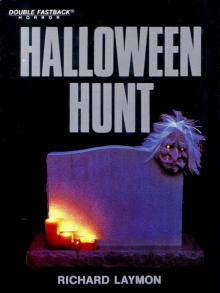 HALLOWEEN HUNT
HALLOWEEN HUNT YOUR SECRET ADMIRER
YOUR SECRET ADMIRER TO WAKE THE DEAD
TO WAKE THE DEAD Alarums
Alarums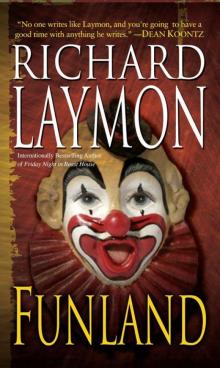 Funland
Funland Cuts
Cuts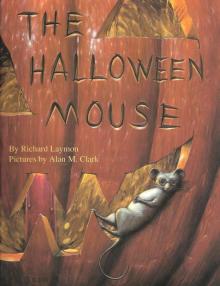 The Halloween Mouse
The Halloween Mouse The Lake
The Lake Beware
Beware Midnight's Lair
Midnight's Lair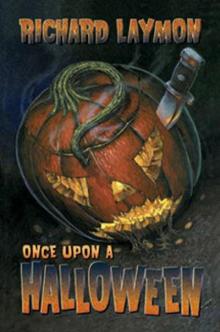 Once Upon a Halloween
Once Upon a Halloween The Glory Bus
The Glory Bus The Hearse
The Hearse The Beast House
The Beast House Dreambox Junkies
Dreambox Junkies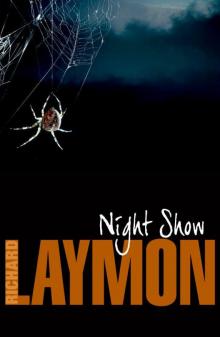 Night Show
Night Show Dark Mountain
Dark Mountain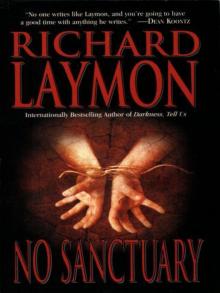 No Sanctuary
No Sanctuary The Traveling Vampire Show
The Traveling Vampire Show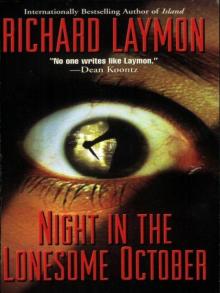 Night in the Lonesome October
Night in the Lonesome October The Woods Are Dark
The Woods Are Dark Blood Games
Blood Games Thin Air
Thin Air Dawson's City
Dawson's City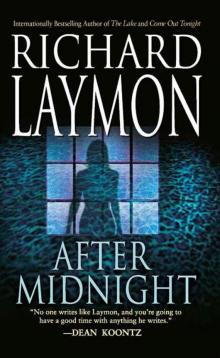 After Midnight
After Midnight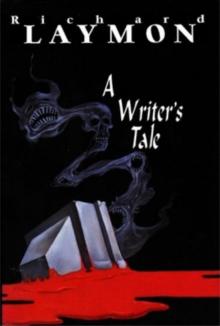 A Writer's Tale
A Writer's Tale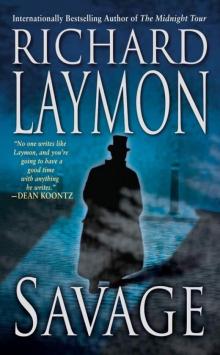 Savage
Savage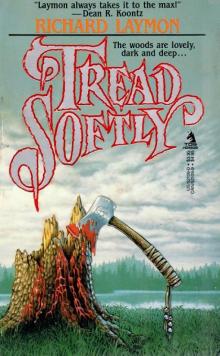 Tread Softly
Tread Softly Quake
Quake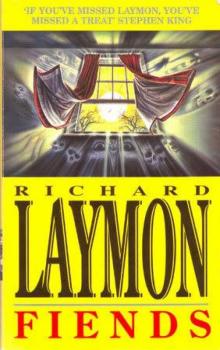 Fiends SSC
Fiends SSC Cardiac Arrest
Cardiac Arrest Island
Island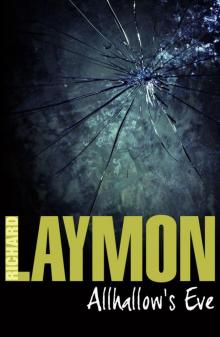 Allhallow's Eve: (Richard Laymon Horror Classic)
Allhallow's Eve: (Richard Laymon Horror Classic)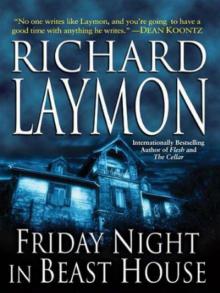 Friday Night in Beast House
Friday Night in Beast House The Cellar
The Cellar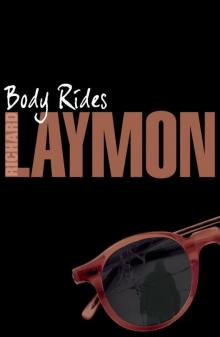 Body Rides
Body Rides The Wilds
The Wilds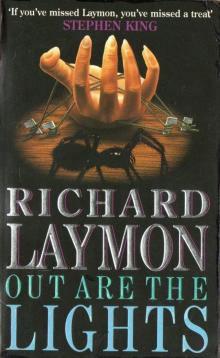 Out Are the Lights
Out Are the Lights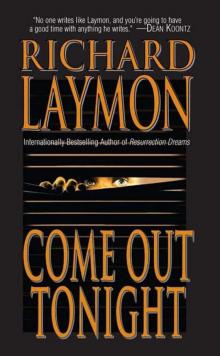 Come Out Tonight
Come Out Tonight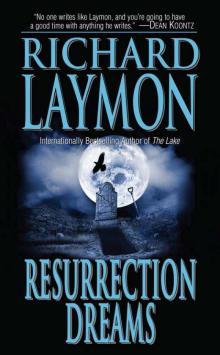 Resurrection Dreams
Resurrection Dreams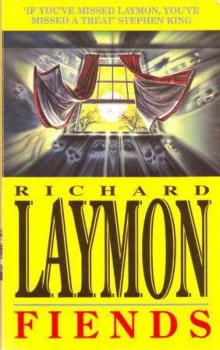 Fiends
Fiends The Cellar bhc-1
The Cellar bhc-1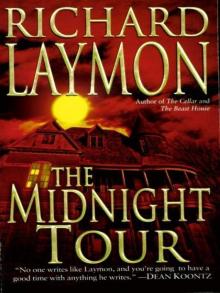 The Midnight Tour
The Midnight Tour The Beast House bhc-2
The Beast House bhc-2 Endless Night
Endless Night Flesh
Flesh The Complete Beast House Chronicles
The Complete Beast House Chronicles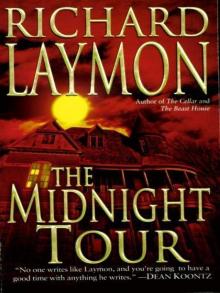 The Midnight Tour bhc-3
The Midnight Tour bhc-3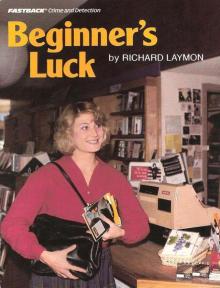 Beginner's Luck
Beginner's Luck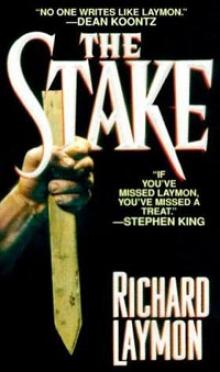 The Stake
The Stake